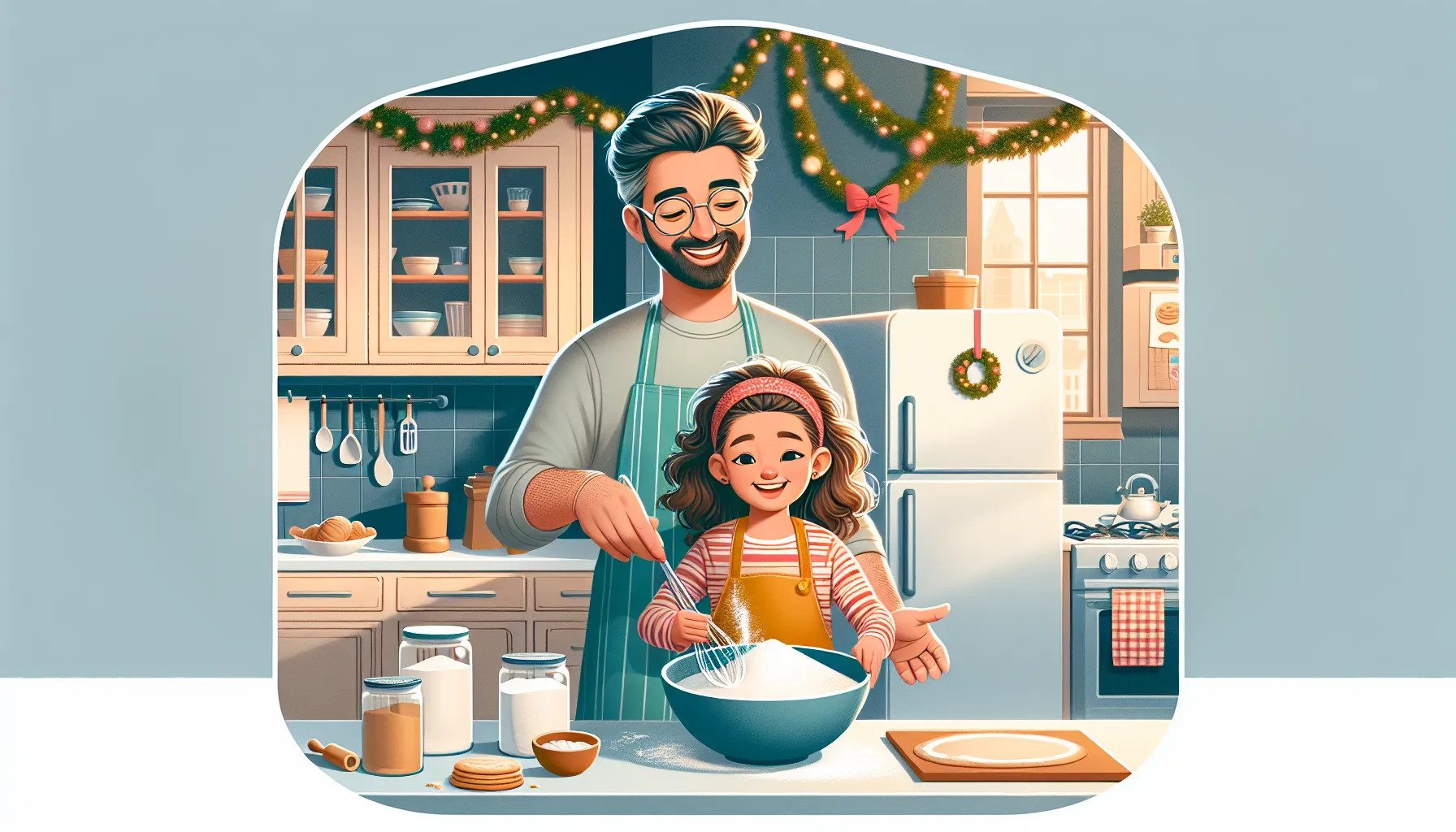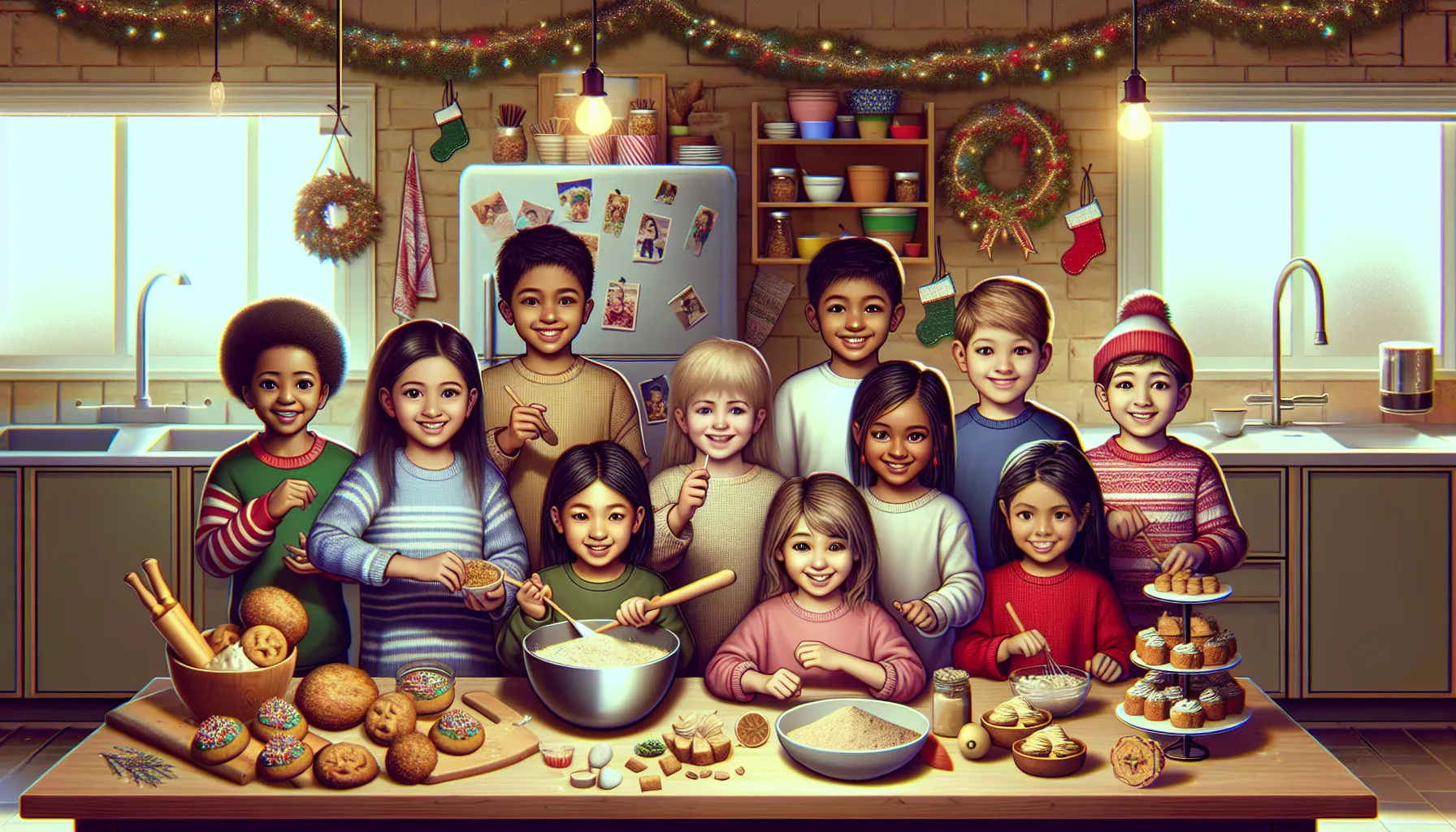
Key Takeaways
- Involving kids in holiday cooking strengthens family bonds, creates cherished memories, and makes the kitchen a space for connection and joy.
- Cooking with kids teaches essential life skills, such as measuring, organization, motor skills, and teamwork, while encouraging creativity.
- Choosing age-appropriate recipes, setting up a kid-friendly workspace, and prioritizing safety ensures a stress-free and fun cooking experience.
- Simple, festive recipes like no-bake treats, holiday cookies, and kid-friendly savory dishes keep children engaged and excited.
- Embracing imperfections, practicing patience, and celebrating their efforts help create positive, lasting holiday traditions.
- The focus on experience over perfection fosters meaningful holiday moments, turning cooking into a joyful family activity.
The holiday season is the perfect time to bring kids into the kitchen and create lasting memories together. There’s something magical about mixing ingredients, sharing laughter, and watching simple components transform into delicious treats. But let’s face it—cooking with kids can feel like a challenge. How do we make it fun, educational, and stress-free all at once?
We believe the key lies in embracing the joy of the process. By involving kids in holiday cooking, we’re not just whipping up festive dishes—we’re teaching valuable skills, encouraging creativity, and spending meaningful time together. From simple recipes to hands-on tasks, there are so many ways to make the kitchen a place of connection and excitement this season. Ready to turn your holiday baking into a family tradition? Let’s dive into how we can make cooking with kids a delightful experience for everyone.
Benefits Of Holiday Cooking With Kids
Holiday cooking with kids offers a mix of joy, education, and connection. It transforms routine meal prep into a meaningful activity, creating lasting impressions.
Building Bonds And Memories
Cooking together fosters closeness through shared experiences. Measuring ingredients, mixing dough, or decorating cookies allows us to spend quality time. These small moments become cherished memories tied to the holiday spirit. How often do we get the chance to slow down and truly connect during busy festivities?
Teaching Life Skills
Kitchen tasks go beyond making food into real-life lessons. Baking teaches measuring, organization, and time management. Younger kids practice counting and motor skills while assisting. Older children learn the value of preparation and attention to detail. What better way to help them grow while sharing something delicious?
Encouraging Creativity And Teamwork
Preparing festive dishes invites kids to think creatively, from decorating desserts to arranging holiday platters. Teamwork comes into play when dividing tasks or solving a recipe challenge. How do we inspire collaboration in ways that feel like fun? Cooking together naturally brings out these skills and strengthens their application.
Preparing For A Fun Cooking Experience

Holiday cooking with kids becomes enjoyable when the activity feels approachable and exciting for everyone involved. Starting with thoughtful preparation builds a foundation for a successful and stress-free adventure in the kitchen.
Choosing Age-Appropriate Recipes
Simplified recipes suited to children’s abilities help keep their interest alive. Younger kids thrive with tasks like mixing batters or decorating cookies, while older children can tackle more involved steps such as measuring or chopping (with assistance). Consider recipes with short steps and visual outcomes, like cupcakes with sprinkles or holiday-shaped cookies. Engaging them in the recipe selection promotes a sense of ownership and enthusiasm.
Setting Up A Kid-Friendly Workspace
A dedicated, tidy workspace caters to smoother cooking experiences. Clear countertops of distractions and pre-portion ingredients into small containers to reduce spills and confusion. Arrange tools within their reach, like child-safe utensils, bowls, and baking sheets. Allow personal touches, such as colorful aprons or festive decorations around the cooking area, to build an inviting atmosphere for young bakers to feel at ease and encouraged.
Ensuring Safety In The Kitchen
Confidently addressing kitchen safety reassures children during the process. Start with discussions about safe practices, explaining the use of oven mitts or the importance of avoiding hot surfaces. Select age-appropriate tools and remain nearby to supervise tasks involving potential risks. For younger participants, introduce plastic knives or blunt-edged utensils to match their capabilities without compromising their confidence.
Fun And Festive Recipe Ideas

Holiday cooking brings joy and creativity to the family kitchen. Including kids in preparing festive recipes keeps them engaged and makes the holidays even more memorable. What better way to celebrate than trying delicious, kid-friendly dishes together?
Easy No-Bake Treats
No-bake recipes keep things simple and fun for all ages. Energy balls made with oats, peanut butter, and chocolate chips require minimal effort and produce little mess. Layered desserts like holiday parfaits allow kids to assemble them with yogurt, granola, and colorful fruit, offering an artistic touch. Melting chocolate to coat pretzels or marshmallows lets creativity flow as kids add sprinkles or crushed candy canes.
Simple Holiday Cookies
Cookies are always a favorite project during the holidays. Basic sugar cookie dough lets kids roll, cut, and shape festive figures. Decorating with icing, edible glitter, and small candies adds a personal flair. Shortbread cookies with holiday-themed sprinkles provide a straightforward recipe for younger children to enjoy. For a flavorful twist, spice cookies with cinnamon and ginger can introduce them to new tastes.
Kid-Friendly Savory Dishes
Savory recipes offer a balanced addition to holiday cooking. Mini pizzas let kids top their dough with sauces, cheese, and vegetables. Festive veggie trays arranged into holiday shapes like trees or wreaths encourage fun while promoting healthy eating. Assembling bite-sized sliders using dinner rolls, deli meats, and cheese keeps it exciting without being overwhelming. Preparing these dishes teaches practical skills like seasoning and assembling ingredients.
Tips For Making The Experience Enjoyable
Cooking with kids during the holidays should feel joyful and memorable. Focusing on the experience rather than achieving perfection helps create lasting family traditions.
Embrace Patience And Flexibility
Holidays often bring excitement, which can lead to extra energy in the kitchen. Keeping a calm mindset when things don’t go as planned helps maintain a positive atmosphere. Encouraging kids to try tasks at their own pace fosters confidence. Are we prepared to pause and let them explore their way of contributing? Granting them that freedom improves their sense of accomplishment.
Celebrate The Mess And Imperfections
Flour on the counter and unevenly shaped cookies might feel messy, but these moments create the best memories. View the spills and smudges as part of the learning process. Asking kids how they’d solve small kitchen mishaps turns frustration into problem-solving. Approaching their efforts with humor can make even the quirkiest creations feel like success.
Rewarding Efforts With Praise
Acknowledging contributions, regardless of the outcome, reinforces a child’s enthusiasm. Complimenting teamwork, creativity, or dedication highlights their achievements. Would a small “thank you” or pointing out how their work made a difference spark more smiles? Positive reinforcement nurtures their desire to participate again.
Conclusion
Holiday cooking with kids is more than just preparing meals; it’s about creating moments that matter. When we embrace the joy, creativity, and occasional chaos of cooking together, we build connections that last far beyond the holiday season. Let’s remember to keep it fun, flexible, and focused on the experience, celebrating every spill and imperfect cookie along the way.
By involving our kids in the kitchen, we’re not just teaching them life skills—we’re fostering a love for family traditions and the magic of the holidays. These shared moments become the memories we’ll all cherish for years to come.
Frequently Asked Questions
Why is cooking with kids during the holidays important?
Cooking with kids during the holidays fosters family bonding, teaches valuable life skills, and lets children express creativity. It’s an opportunity to create lasting memories while sharing the holiday spirit.
What are the benefits of involving children in holiday cooking?
Involving children in holiday cooking helps build practical skills like measuring, organization, and teamwork. It also strengthens family connections and makes meal prep a fun, shared experience.
What types of recipes are best for kids during holiday cooking?
Choose age-appropriate recipes. Young kids enjoy simple tasks like mixing and decorating, while older children can try more complex steps such as chopping and assembling dishes.
How can I make holiday cooking easier for kids?
Set up a kid-friendly workspace by organizing tools and ingredients within reach. Use age-appropriate utensils and give clear instructions to keep them engaged and safe.
What are some kid-friendly holiday recipe ideas?
Easy recipes include no-bake energy balls, layered desserts, or decorated cookies. For savory options, try mini pizzas or festive veggie trays to promote healthier eating.
How can I ensure safety while cooking with kids?
Discuss kitchen safety beforehand and assign tasks based on age and ability. Use child-safe tools, supervise closely, and teach practices like careful handling of sharp objects and hot surfaces.
How can I handle the mess when cooking with kids?
Embrace the mess as part of the experience. Spills and imperfections are learning moments, so focus on the fun instead of keeping everything spotless.
What should I do when things don’t go as planned in the kitchen?
Stay patient and flexible. Holiday excitement may lead to mistakes, but maintaining a calm and positive attitude encourages kids and keeps the experience enjoyable.
How can I make cooking with kids more rewarding?
Praise their efforts and celebrate the results, regardless of imperfections. Positive reinforcement boosts confidence and builds enthusiasm for future cooking activities.
How do I turn holiday cooking into a family tradition?
Focus on the experience itself—enjoying the process, sharing laughs, and making memories. Repeating the tradition yearly strengthens bonds and creates cherished family moments.

